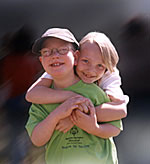This program supports research and research training relevant to normative social, affective, and personality development in children from the newborn period through adolescence, and on the impact of specific aspects of physical and social environments on the health and psychological development of infants, children, and adolescents. Within this context, investigations of socio-cultural, familial, individual, and biological influences on development are of interest. Also of interest are studies of child developmental processes in high-risk settings (e.g., in violent or abusive environments, or families experiencing stressors such as poverty, unemployment or parental depression).
Social Development. Interest areas include interpersonal processes, forming and maintaining relationships (including parent-child, caregiving, peer, friend, sibling), attachment models, and moral development. Also encouraged are studies of social competence, social withdrawal, social role formation and maintenance, prosocial behavior, and aggression.
Affective and Personality Development. Studies of personality, temperament, emotion, and motivation (particularly achievement, school-related, pro- and anti-social) and the relations among these domains are of interest. Other focus areas include self processes, including self-esteem, self-evaluation, self-concept, self-control, self-efficacy, and social identity.
Child Maltreatment. Areas of focus include antecedents and consequences of child abuse and neglect, as well as psychosocial and psychobiological factors which shed light on the mechanisms by which child abuse and neglect result in harmful effects. In addition, there is interest in identifying factors which help children cope with abuse and neglect and the development of theory-driven prevention and intervention strategies to reduce the risk for abuse and neglect and to mitigate or ameliorate the emotional, social, and cognitive effects of abuse and neglect on individual development.
Violence. Studies of the development of aggressive and violent behavior in childhood and adolescence (including individual, family, and socio-cultural influences and developmental pathways) are of interest, as are theory-based violence prevention and intervention efforts. An additional focus area is identification of the effects of domestic and community violence on individual development during infancy, childhood, or adolescence, and factors within family, social, and school contexts which mitigate the consequences of violence on the physical, cognitive, social, and emotional development of children.
